When a hundred flowers wither in my hometown,
When will this wandering child return?
Today, even the branches and leaves lament my absence,
But I can return, I can return.
Amidst snowflakes and chilly winds,
This wandering child is about to return.
Tomorrow, my old blankets will be in my luggage,
I have returned, I have returned.
—— by Xiao Yi, “Original Work”
On May 21st, Esther Hall invited alumna Zhang Beiyu to hold an online sharing session to discuss her experiences studying abroad. Let‘s take a look!
The journey of wandering
Zhang believes that wandering implies fluidity, which means obtaining more resources and improving oneself through different avenues. In a sense, this kind of wandering has a romantic feel. Wandering does not mean being without roots; eventually, one will settle in a particular place.
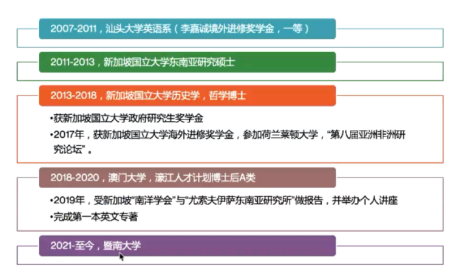
01
Have you thought about going abroad for studying?
Before going abroad, it is important to clarify the purpose of studying abroad.
Are you going abroad to gain experience, broaden your horizons, or pursue an“ivory tower” effect (meaning that you want to keep a distance from society and believe that academia is pure)? Or are you going abroad to learn new knowledge and pursue academic ideals? This will determine your behavior after going abroad.
The speaker shared a phenomenon: many Chinese people who study abroad are just trying to get a diploma and are satisfied with passing their courses without much effort. The speaker does not deny these people, but emphasizes that each person should take responsibility for their own decisions and have a clear plan for their future.
For the speaker, studying in her interested field will keep her passionate and able to withstand external setbacks, so she is determined to study abroad.
Once you have decided to study abroad, you need to plan before leaving.
First, you need to write a good personal statement. Admission officers will value your interest and desire for knowledge in this field.
Second, you need to have language skills. Most schools now require IELTS, TOEFL scores, etc. to prove your language proficiency, which is a necessary hurdle to cross.
Finally, do not overlook financial support. In her graduation year, the speaker received an RMB 80,000 scholarship from the Li Ka Shing Foundation, which was a large amount of money at the time, but it was only a drop in the bucket compared to the cost of studying for a master's degree in Singapore.
For an ordinary salaried family, more than RMB 200,000 a year for living expenses is difficult to support. The speaker then discussed with her parents and only asked for the first year's living expenses. She supported herself for the remaining two years of her half-working, half-studying postgraduate career.
What can you gain from studying abroad?
02
Heavy coursework, full English teaching mode, and classroom pressure.
During her graduate studies, the speaker had to choose three courses each semester, and each course required reading of about 40 pages in English per week, followed by feedback writing.
Therefore, for a long period of time, the speaker had to study and read books in the library every day to keep up with the progress.
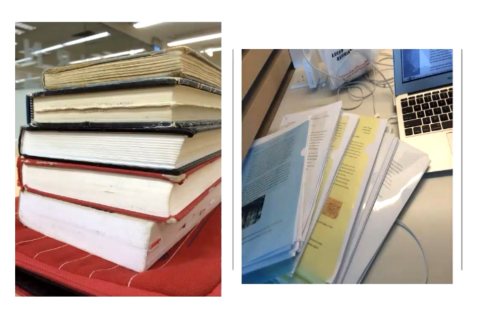
The Books from Library by the Speaker
Working-study (challengingyourself to the limit).
Working-study and working with locals can better experience local life. During her time as a teaching assistant, thespeakerworked in the office every morning from 8 to 12, so the work time would take up the time she used to study, and she had to stay up late to study.
Thespeaker reminds everyone to never forget to pay attention to their health in work and life.
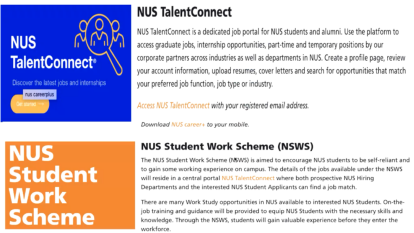
Part-time jobs offered by the school for international student
Students who enjoy diverse and cross-cultural backgrounds.
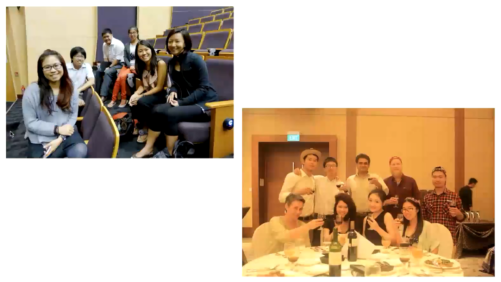
The speaker and her friends from different countries
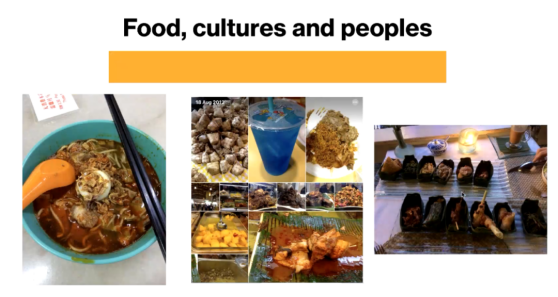
Southeast Asian food
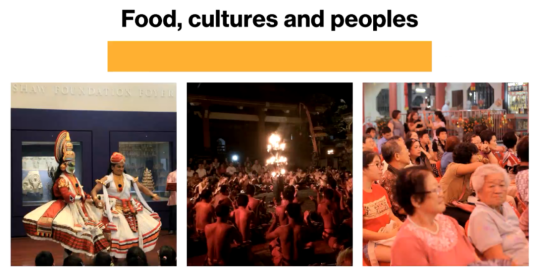
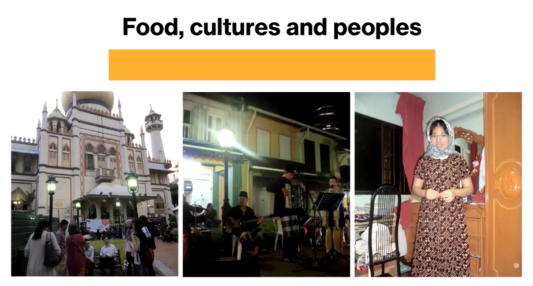
Folk activities in Southeast Asia
03
Marriage and Social Circle
First, the speakeraddressed two misconceptions and shared her opinion.
1. “The more you read, the harder it is to find a boyfriend?”
Thespeaker believes that a person’s choice of friends depends on their vision, values, and so on. The more books a woman reads, the more likely she is to meet men who are her equals, rather than men who look down on her. This equality in marriage is more likely to maintain happiness.
In her circle of doctoral friends, most couples are dual-doctorate, and everyone is able to discuss work, parenting, and other matters equally and rationally.
2. “Female doctoral students are the third-class people?”
Doing experiments is really hard work, and they will focus more on their research results, but they can also be very open when they go out and date.
04
Mother or Female Doctoral Student, Can You Have Both?
Is it possible for scholars to have both the roles of a mother and a doctoral student? First, the senior student negated several misconceptions.
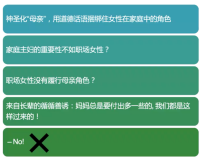
She believes that the child is hers, and she is responsible for the child. However, the field she studies is also like a child to her, and she wants both. Dealing with both may be slow, but she believes she can do it.
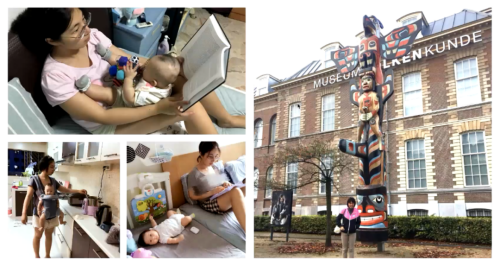
slice of life
However, caring for the child day and night caused thespeakerto suffer from mild depression. She wanted to find her own life, not just take care of the child.
She told her husband that she wanted to go out and walk around, and her husband, who shared her values, was very understanding. He took leave to stay at home with the child and allowed her to attend an academic exchange meeting in the Netherlands. The short trip made the senior student’s mood much happier and she quickly recovered.
Her own experience has given the senior student a deeper understanding of the relationship between motherhood and career for women. She believes that to break the binary view of women being bound by “motherhood,” the following steps need to be taken:
l Acknowledge the difficulties women face in family, academics, and career.
l Both roles can be achieved, but men need to share the burden.
l Society, companies/universities should provide more support.
l Women need to make more effort to balance
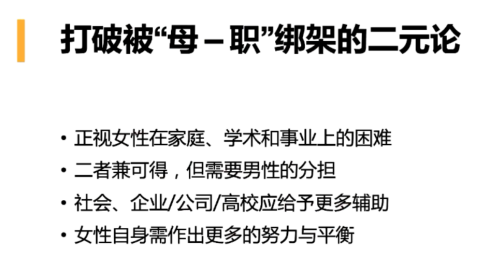
Q&A Session
Next, the speaker answered questions from students.
01
Q: How to adapt to cultural differences when studying abroad? How to adjust your mentality when under pressure?
A:“The cultural differences between Singapore and China are not particularly large, and I adapted quite well when I went there. Some of my friends who went to study in the United States said that there can be some discrimination there, and some communities can be quite dangerous. Singaporeans also have some discrimination against mainland Chinese people, and I was once mistaken for a‘mother who accompanied her child to study’.
When under pressure, I would watch American TV shows. At that time, academic pressure was particularly high, and I didn't have much time to participate in other entertainment activities, so I just went to sleep in the dormitory. On weekends, I would chat with friends and have meals together. Fortunately, we can help each other adapt.”
02
Q: How to further improve English?
A:“English is the key to opening the door. First of all, you need to meet the school's requirements. But in fact, the English you need in life is not just as simple as the IELTS test. You need to read literature and be forced to use more English when writing papers, and gradually improve.
Also, I hope everyone can be more confident. In the process of continuous practice, your language skills will improve. English is just a tool for communication, and there is no need to feel inferior because of it.”
03
Q:Can professors really tell if the motivation in a personal statement is genuine? Is it possible that someone writes about being passionate, but actually isn’t?
A:“Indeed, many people may write like that, but everyone's background is different. You need to reinforce your own characteristics and the knowledge you have accumulated, highlighting to those professors how well your abilities meet their requirements and how their projects would benefit from having you on board.
Not only do you want to learn from them, but you also want to demonstrate your contributions.”
04
Q:During the learning process, is it possible to feel tired of studying?
A:“I often have such moments. I wrote that book of nearly 100,000 words, and for half of the time, I didn’t feel like writing anymore and wanted to give up.
At this point, I will let myself relax because even if you force yourself to write, you have already written it out. I will choose to exercise, release stress, or watch TV shows and dramas. Human energy is like a chain, and you need to give yourself some space to relax, adjust your pace, and adapt to your mood. When doing long-term work, you must pay attention to taking breaks. You can also break down your goals into small chunks and achieve them one by one.”
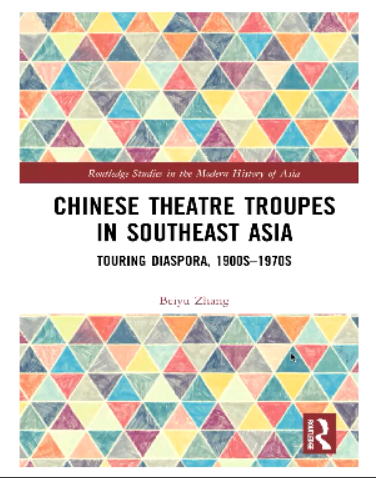
The speaker’s English Works
05
Q: How to deal with questioning on your research from others?
A:“If someone questions your research, you can ask them if they have better ideas. If they do, it can be helpful for your research because your own thinking may be limited. No research is perfect in the world, so if someone's opinion hits your sore spot, it means that their opinion is helpful. If they do not have a better perspective, their questioning is a failure.”
06
Q: Why did you choose to major in history? What are the difficulties of pursuing a cross-disciplinary PhD?
A:“To be honest, it's because of history. I am interested in the culture of overseas Chinese, especially in contemporary times. Most of the research is interdisciplinary, and history is more of a training of thinking for me.
Pursuing a cross-disciplinary PhD is interesting because it can enrich your thinking. If you want to do research, don’t be afraid to read widely and try to cover a broad range of topics.”
07
Q: How to balance multiple tasks at once?
A:“Everyone wants to do more things in a limited amount of time, so it’s important to create a time schedule, prioritize tasks, and solve them one by one in time modules.”

